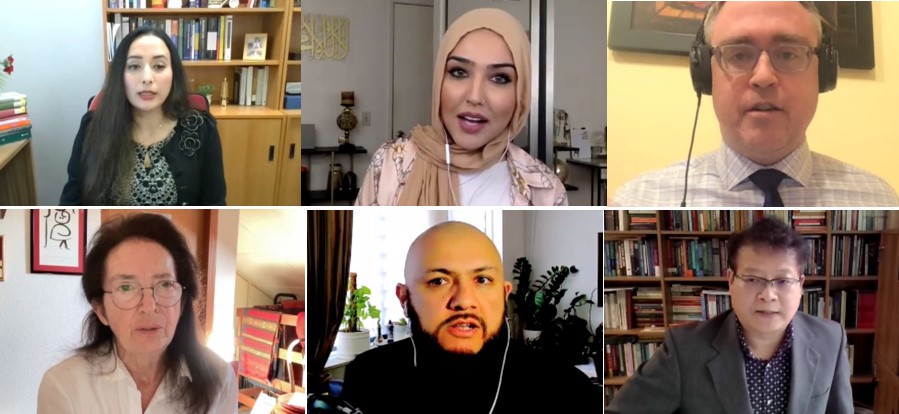Latest News
The CPLR Webinar Series on Asian Perspectives on Human Rights (IV): Who Won the War in Afghanistan? The Present and Future of Human Rights and Governance Under the Taliban Regime
On 26 May 2022, the Public Law and Human Rights Forum (CPLR) organised the fourth webinar in the Asian Perspective on Human Rights series to discuss how forty years of war have impacted Afghanistan and on what term should the international community engage with the Taliban government to improve the country’s social stability and protect the human right of its people.

top row: Dr Fozia LONE, Ms Pashtana KHATAB, Dr James FRY
bottom row: Ms Norah NILAND, Mr Sangar PAYKHAR, Prof Jiangyu WANG
The webinar kicked off with a welcome speech by Dr Fozia LONE (Associate Professor, Associate Director of CPLR, School of Law, City University of Hong Kong). She thanked all the speakers and audience for their participations in this event, and explained the aim of this webinar is to provide a platform for scholars and experts to critically debate over topics such as human rights and governance situation in Afghanistan, and challenges that women face under the Taliban regime. Five distinguished panellists were invited to speak at the webinar, including: Prof Jiangyu Wang (Professor, Director of Centre for Chinese and Comparative Law, School of Law, City University of Hong Kong); Ms Norah NILAND (Co-Founder, Activist, United Against Inhumanity); Dr James FRY (Associate Professor, Faculty of Law, the University of Hong Kong); Mr Sangar PAYKHAR (Host of the Afghan Eye Podcast, Freelance Journalist, Commentator on Afghan Current Affairs); Ms Pashtana KHATAB (Clinical Psychologist, Therapist and Active Afghan Diaspora).
Ms Niland explained that the repressive political regime is not the only reason why Afghanistan is facing humanitarian crisis. External policies, such as the U.S. decision to withdraw aids and external financial support, freezing the country’s foreign reserves, has also pushed Afghanistan's economy to the verge of collapse. A significant proportions of the population are thus at risk of poverty, deprivation and starvation. The dominant ideology of patriarchy in Afghanistan implies that women livelihoods are being deprived severely under the crisis. She also commented that the Bonn agreement appears to be contradictory in respect to its objectives as there is a clear attempt to build a democratic and inclusive environment in the country, while at the same time they support war criminals to retain in key government positions.
Mr Paykhar was of the view that Afghanistan is still a pre-modern society. The Taliban regime is not merely a political party. Instead, it reflects that a number of Afghan people are associated with conservative social values and norms. They believe western occupation and ideas need to be combated to regain peace and security for their community. He stressed that there is no winner after four decades of war since the countries is now suffering from acute poverty and instability as a result of the conflict.
This was followed by the presentation of Ms Khatab, who outlined the history of the forty-year-old war, explaining that economy and political order are correlated to the number of illegal and terrorist activities. She then discussed the grave human rights violation in Afghanistan in the last two decades, where civilians are exposed to extrajudicial killing, torture of suspected and enforced disappearance etc. Therefore, rather than analyzing whether human rights protection deteriorated after the Taliban takeover, the problem is how the Taliban can build off of the country’s long history of human rights violations.
Dr Fry shared with the participants his observations on the nature of the United Nations Assistance Mission in Afghanistan (UNAMA). Its ability to interfere with the country’s internal affairs and human rights protection is fairly limited as its aim and positioning is to provide assistance to the local government. The underpinning principle of such scheme is to respect the state’s decision on their local affairs and directions.
Finally, Prof Wang provided a detail analysis on China’s Afghanistan policy. He examined the speech that was given by Chinese foreign minster Wang Yi, which suggested that China shares the same concern with other international community and is in the hope that Afghanistan could build an inclusive political structure, protect human rights, make a clear break with other terrorist forces and pursue a peaceful foreign policy. Taking into account China’s attitude at multiple international meetings, it can be deduced that China’s objective is to make herself the centre regarding the international and regional relations on Afghanistan through diplomatic and economic means.
On behalf of CPLR, Dr Lone thanked the speakers for delivering insightful and thought-provoking ideas and all the audience for their participations which made the webinar a great success.
2022 年 5 月 26 日,公法與人權(quán)論壇 (CPLR) 組織了第四次亞洲視角人權(quán)系列網(wǎng)絡(luò)研討會,討論阿富汗長達(dá)四十年的戰(zhàn)爭在何種層面上影響了該國,以及國際社會應(yīng)以何種態(tài)度與塔利班政府接觸以改善該國的社會穩(wěn)定性和人權(quán)保障。

上行: Fozia LONE博士, Pashtana KHATAB女士, James FRY博士
下行: Norah NILAND女士, Sangar PAYKHAR先生, Jiangyu WANG教授
網(wǎng)絡(luò)研討會以 Fozia LONE 博士(香港城市大學(xué)法學(xué)院副教授、CPLR 副主任)的歡迎致辭拉開帷幕。她感謝所有演講者和觀眾參與本次活動,並解釋本次網(wǎng)絡(luò)研討會的目的是為學(xué)者和專家提供一個平臺,就阿富汗在塔利班政權(quán)下的人權(quán)保護(hù)和治理狀況以及女性面臨的挑戰(zhàn)等話題進(jìn)行批判性辯論。五位傑出的小組成員受邀在網(wǎng)絡(luò)研討會上發(fā)言,包括:Jiangyu WANG 教授(香港城市大學(xué)法學(xué)院教授,中國法與比較法研究中心主任); Norah NILAND 女士(United Against Inhumanity 創(chuàng)始人、活動家); James FRY 博士(香港大學(xué)法律學(xué)院副教授); Sangar PAYKHAR 先生(Afghan Eye Podcast主持人、自由記者、阿富汗時事評論員); Pashtana KHATAB 女士(臨床心理學(xué)家、治療師和阿富汗僑民活動家)。
Ms Niland解釋說,塔利班的專制政權(quán)並不是導(dǎo)致阿富汗面臨人道主義危機的唯一原因。美國決定撤出援助和資金支持、凍結(jié)該國外匯儲備等外部政策也將阿富汗經(jīng)濟推向了崩潰的邊緣,大部分人口將因此面臨貧困、被剝削和飢餓的困境。阿富汗父權(quán)制的主導(dǎo)意識形態(tài)意味著婦女的生計在危機下將被嚴(yán)重剝奪。她還評論說,波恩協(xié)議的目標(biāo)似乎是矛盾的,因為協(xié)議表明希望該國能建立一個民主和包容的環(huán)境,同時他們支持戰(zhàn)犯繼續(xù)擔(dān)任關(guān)鍵政府職位。
Paykhar 先生認(rèn)為阿富汗仍然是一個封建社會。塔利班政權(quán)不僅僅是一個政黨,它反映了許多阿富汗人乃遵從保守的社會價值觀和規(guī)範(fàn)。他們認(rèn)為需要打擊西方的佔領(lǐng)和思想,以恢復(fù)他們社區(qū)的和平與安全。他強調(diào),這四十年來不斷的衝突導(dǎo)致國家陷入極度貧困和不穩(wěn)定之中,這場戰(zhàn)爭其實並沒有贏家。
隨後是 Khatab 女士的分享,她概述了這場長達(dá)四十年的戰(zhàn)爭歷史,並解釋說經(jīng)濟和政治秩序與非法恐怖活動的數(shù)量息息相關(guān)。接著,她討論了過去二十年來阿富汗嚴(yán)重侵犯人權(quán)的行為,如平民遭受法外處決、 被失蹤和疑犯遭酷刑對待等。因此,與其分析塔利班接管後人權(quán)保護(hù)是否有惡化,倒不如討論在於塔利班如何在該國長期侵犯人權(quán)的歷史基礎(chǔ)上改善這情況。
Fry博士與與會者分享了他對聯(lián)合國阿富汗援助團(tuán)(UNAMA)性質(zhì)的看法。它干涉該國內(nèi)政和人權(quán)保護(hù)的能力有限,因為它的目的和定位是向當(dāng)?shù)卣峁┰_@種援助方案的原則是尊重國家對他們內(nèi)政事務(wù)和方向的決定。
最後,Wang教授對中國的阿富汗政策進(jìn)行了詳細(xì)分析。他回顧了中國外交部長王毅的講話,認(rèn)為中國與其他國際社會有同樣的考慮,希望阿富汗能夠建立包容的政治結(jié)構(gòu),保護(hù)人權(quán),與其他恐怖勢力明確決裂,並奉行和平外交政策。從中國在不同國際會議上的取態(tài),可以推斷出中國希望能通過外交和經(jīng)濟手段成為阿富汗國際和其他地區(qū)關(guān)係的中心。
Lone 博士代表 CPLR 感謝演講者在研討會中分享獨到和發(fā)人深省的見解,以及所有旁聽人士對會議的支持,這使研討會能圓滿成功地舉行。